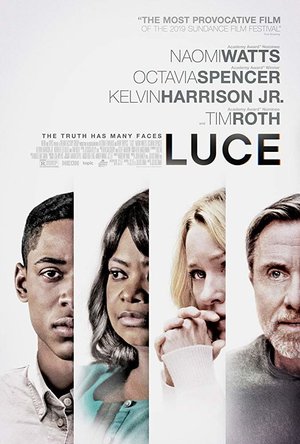Search
Search results
Lee (2222 KP) rated Luce (2019) in Movies
Oct 30, 2019
Luce (Kelvin Harrison Jr) is the perfect student. Captain of the high school track team, a passionate member of the school debating society, a great writer and a polite, grown-up young man that just seems too good to be true. Luce was adopted at the age of 9 from war-torn Eritrea by white couple Amy (Naomi Watts) and Peter (Tim Roth, sporting a pretty dodgy American accent). Following years of therapy and the devoted efforts of Amy and Peter, he seems to have successfully put his horrific and traumatic childhood behind him, embracing his future in America.
But then one day, Luce's history teacher, Harriet Wilson (Octavia Spencer) becomes disturbed by a recent assignment that Luce has submitted. The purpose of the assignment was to write an essay in the style and thinking of a historical figure of their choosing - an idea which Luce seems to have embraced a little too passionately with his choice of Frantz Fanon, a black philosopher who was highly supportive of violent revolution. At the same time, a search of Luce's locker reveals some highly explosive fireworks, and Harriet is worried to the point where she calls Amy into the school in order to discuss her concerns.
The assignment, and the fireworks discovery, leads to a series of conflicts among all of the main characters. Luce remains polite and calm throughout, claiming that he was merely doing what was asked of him for the assignment. He states that his locker is shared with friends, so the fireworks must belong to one of them. Tensions are also high between Luce’s parents, seemingly regarding some lingering resentment they have about the fact that Luce is not their biological child. Meanwhile, Harriet is involved in a series of cool, calm stand offs with Luce, each of them believing that there is more to the other than meets the eye.
There are a lot of times during Luce where motivations and actions of characters aren’t very clear. A number of tense moments occur along the way too, in order to try and ramp up the tension, including the introduction of Harriet’s mentally ill sister, horrible racist graffiti on Harriet’s house and accusations of sexual assault. You never know who to trust or what to think, and it all feels as though it’s building towards something big.
Unfortunately though, that’s not the case, and it all just kind of fizzles out towards the end. It’s clear that the filmmakers are more interested in delivering undertones of privilege and prejudice throughout, promoting more questions than they provide answers, and that’s not for me. Overall a pretty solid movie, let down in its delivery towards the end.
But then one day, Luce's history teacher, Harriet Wilson (Octavia Spencer) becomes disturbed by a recent assignment that Luce has submitted. The purpose of the assignment was to write an essay in the style and thinking of a historical figure of their choosing - an idea which Luce seems to have embraced a little too passionately with his choice of Frantz Fanon, a black philosopher who was highly supportive of violent revolution. At the same time, a search of Luce's locker reveals some highly explosive fireworks, and Harriet is worried to the point where she calls Amy into the school in order to discuss her concerns.
The assignment, and the fireworks discovery, leads to a series of conflicts among all of the main characters. Luce remains polite and calm throughout, claiming that he was merely doing what was asked of him for the assignment. He states that his locker is shared with friends, so the fireworks must belong to one of them. Tensions are also high between Luce’s parents, seemingly regarding some lingering resentment they have about the fact that Luce is not their biological child. Meanwhile, Harriet is involved in a series of cool, calm stand offs with Luce, each of them believing that there is more to the other than meets the eye.
There are a lot of times during Luce where motivations and actions of characters aren’t very clear. A number of tense moments occur along the way too, in order to try and ramp up the tension, including the introduction of Harriet’s mentally ill sister, horrible racist graffiti on Harriet’s house and accusations of sexual assault. You never know who to trust or what to think, and it all feels as though it’s building towards something big.
Unfortunately though, that’s not the case, and it all just kind of fizzles out towards the end. It’s clear that the filmmakers are more interested in delivering undertones of privilege and prejudice throughout, promoting more questions than they provide answers, and that’s not for me. Overall a pretty solid movie, let down in its delivery towards the end.
